Stay in the know on all smart updates of your favorite topics.
Building a shared vision of the city - with LEGO!
Building the largest interactive LEGO model of the future city ever!
Imagine a model of the city; however, instead of a literal representation, this is a sculpture that holds ideas and dreams from citizens, policymakers, entrepreneurs and visitors about what the city might be like after we solve major transitional challenges (e.g. sustainability, energy, equality, smart).
What would it feel like to be in this city? What do people wish this future city to become?
the goal
A model of the city that contains the ideas that a diverse group of people have about how the city might emerge from major transitional change like climate adaptation, sustainability, equality, smart. Imagine the city from what might be and what opportunity change offers.
the form
A room-sized model built with LEGO in a public space and with interactivity (e.g. app / QR link / AR) to share the stories that this model contains.
the process
Lego is an powerful way to evoke and capture stories about how people think about something. Through a series of workshops, people from all parts of the city will be invited to share how they think about the future of the city and capture their stories in a collective model. An interactive installation opens up those stories to passers-by and other participants.
partners
finance, organisational, tech
call to action
Get in touch if you want to contribute to the realisation of the largest LEGO city vision model ever!
Excursieprogramma in Barcelona (tijdens Smart City Expo World Congress) - in Dutch

De jaarlijkse Smart City Expo World Congress komt er al weer bijna aan! Deze vindt plaats op 16 – 18 november 2021 (maar eigenlijk begint het al de 14e). Naast het officiële missieprogramma van RVO hebben Amsterdam Smart City, G40, Future City Foundation en BTG ook eigen excursies en kennissessies georganiseerd.
Ben je in Barcelona voor de Smart City Expo en/of de RVO missie, dan kun je natuurlijk met ons mee! Door kennis op te doen voor de Nederlandse praktijk en andere deelnemers nog beter te leren kennen, kun je je tijd in Barcelona zo optimaal benutten.
Deelnemen aan de excursies is kosteloos. We verwachten dat je op eigen gelegenheid naar de programmalocaties komt.
Conceptprogramma:
Maandag 15 november
Hoe worden we de best verbonden samenleving in de wereld?
9.00 uur – Ontbijt en aftrap
We gaan naar Barcelona om te leren hoe we van Nederland de best verbonden samenleving van de wereld kunnen maken. We leggen uit wat deze moonshot is en hoe je daaraan kan meedoen. Want er zijn nogal wat acties te verrichten.
10.00 uur – Deelmobiliteit met Donkey Republic
Hoe zorgen we dat deelmobiliteit een oplossing is voor duurzame mobiliteit en voorkomen we verrommeling van de openbare ruimte? We gaan in gesprek met Allard Kalverkamp van Donkey Republic, een deelfietsoperator, die zowel in Nederland als in Barcelona werkt. Hoe gaan de gemeente Barcelona en de Metropoolregio om met de opkomst van deelmobiliteit? En natuurlijk fietsen we zelf ook een rondje! Locatie volgt (centrum Barcelona).
12.00 uur – Lunch en wrap-up
Learnings ophalen. Hoe kunnen we deze kennis toepassen in Nederland?
13.30 uur – Burgerparticipatie met Decidim
Hoe betrek je inwoners bij een stad en zorg je met een platform voor meer democratisering van bestuur? Hoe creëer je in samenspraak met burgers oplossingen? Ga mee naar Decidim, een open-source democratisch platform dat door de stad Barcelona wordt gebruikt om burgers te betrekken. Arnau Monterde vertelt hoe zij werken en tot welke veranderingen methodes hebben geleid? Locatie: Canòdrom, Carrer de Concepción Arenal, 165, 08027 Barcelona
15.00 uur – Borrel en terugkoppeling van de middag
Dinsdag 16 november
Gebiedsontwikkeling
9.00 uur: Ontbijt
Hoe ga je van instrumentontwikkeling naar gebiedsontwikkeling? Hoe schaal je de smart city op en zorg je dat zij het nieuwe normaal wordt?
10.00 – 12.00 uur: Tour door Superblok Poblenou
In deze wijk zijn alle essentiële functies zijn op 15 minuten wandelen te bereiken. Ook is de mobiliteit in dit gebied aangepakt. Hoe kwam dit superblok tot stand en hoe kunnen Nederlandse steden en gemeentes hiervan leren? Exacte programma en locatie volgen.
12.00 – 13.00 uur: Lunch en wrap-up
Wat kunnen we leren van hoe Poblenou is opgezet? Is dit ook werkbaar voor Nederlandse steden en dorpen? En hoe betrek je bewoners in zo’n ontwerp?
13.00 – 18.00 uur: Smart City Expo (Fira Barcelona)
Tijd om te netwerken bij de Paviljoens van allerlei landen en steden. Doe mee met een inkomende of uitgaande missie, ga mee op safari, leer de mensen bij Holland Paviljoen kennen en ontdek welke kansen de beursvloer biedt.
Woensdag 17 november
Ethiek en sensoriek (van het riool van Barcelona)
9.00 uur: Ontbijt
We beginnen bij de vraag hoe waardecreatie kan ontstaan via dit project. Ook gaan we in op het nieuwe boek van de CityDeal (in de maak) ‘Zo creëer je waarde’.
11.00 – 12.00 uur: Bezoek aan de riolen van Barcelona
We bezoeken een meetstation en zien hoe data worden verzameld op wijkniveau. Wat kun je leren van het riool op gebied van watermanagement en hoe is het gesteld met de gezondheid van inwoners? Hoe koppel je sensordata aan gericht beleid en aan handelingsperspectieven? Daarna bezoeken we het kantoor van s::can en leren we meer over de gebruikte sensoren en de data. De toepassing op wijkniveau in plaats van op stadsniveau in Barcelona is redelijk uniek. Wat kunnen wij van hen leren en wat is toe te passen in Nederland?
12.00 – 13.00 uur: Lunch
Lunch en debat over de ethische vragen die dit met zich meebrengt.
13.00: Smart City Expo
Tijd voor een tweede middag op de Smart City Expo (Fira Barcelona).
Meld je hier aan voor het hele programma of voor aparte programmaonderdelen:
https://kennislab.typeform.com/Barcelona2021
Heb je nog vragen? Stuur dan een bericht naar nancy@amsterdamsmartcity.com.
CoECI x Designing Cities for All #2

25 oktober - 20:00 uur - IJzaal PDZ, op locatie en livecast
De echte waarde van kunst
Kunst geeft de stad uitstraling, biedt levendigheid, verrast en daagt uit. Het kan tot nadenken zetten en het kan ook gewoon inspirerend en mooi zijn. Het is een belangrijke reden voor mensen om in een stad te willen wonen, werken en recreëren. Kunst is dus belangrijk om de stad leefbaar te houden, maar is er nog wel ruimte voor de creatieve makers in de stad en staat de economische waarde van kunst wel in verhouding tot de maatschappelijke waarde die het heeft?
In deze tweede aflevering van Centre of Expertise for Creative Innovation x Designing Cities for All gaan we hierover in gesprek met onderzoekers, beleidsmakers en natuurlijk kunstenaars. Ook gaan we het hebben over het maatschappelijk verdienvermogen. Wat is het, hoe bereik je het en wat voor rol kunnen kunstenaars en ontwerpers hierin hebben?
Met in dit programma:
Sepp Eckenhaussen is cultuurcriticus, onderzoeker en initiatiefnemer. Hij werkt als onderzoeker bij het Instituut voor Netwerkcultuur (Hogeschool van Amsterdam), waar hij zich bezighoudt met zelforganisatie, beleid en alternatieve verdienmodellen in (digitale) cultuur. Ook is Sepp co-directeur van Platform BK, een ledenvereniging en actieve denktank die de rol van kunst in de maatschappij onderzoekt en strijdt voor een beter kunstklimaat en een sterkere positie van de kunstenaar.
Gerbrand Bas is als productontwerper opgeleid aan de toenmalige Akademie voor Industriële Vormgeving. Na een carrière als ontwerper houdt hij sinds 15 jaar vooral bezig met het verbeteren van de randvoorwaarden voor design en de culturele en creatieve sector in het algemeen. Hij doet dat vooral in zijn functie als directeur van Designlink, als uitvoerende secretaris van de Federatie Creatieve Industrie en via diverse advies- en bestuursfuncties in de creatieve industrie.
Kevin de Randamie, als hiphopartiest bekend onder de naam Blaxtar, is oprichter van Braenworks Academy, een business school voor creatieve professionals. In 2010 ondervond De Randamie tijdens de economische crisis de gevolgen van een slecht ontwikkelde businesskant. Hij begon daarop een onderzoek naar het gebrek aan zakelijk inzicht bij hemzelf, artiesten en andere creatieven. Hij werd een businesscoach voor andere artiesten, maar ook designers, dansers en producenten. Daaruit kwam Braenworks voort, een businessplatform waar creatieve professionals elkaar vinden en versterken op zakelijk gebied. Als lid van het Topteam Creatieve Industrie wil de Randamie de werelden van sociale innovatie, human capital en mind-settraining bij elkaar brengen.
Josien Pieterse is mede-oprichter en co-directeur van Framer Framed. Framer Framed is een platform voor kunst en cultuur, met een expositieruimte in Amsterdam. De exposities bevinden zich op het snijvlak van hedendaagse kunst, visuele cultuur en politiek. De exposities tonen werk van bekende en onbekende kunstenaars die wereldwijd actief zijn en zich verhouden tot maatschappelijke vraagstukken. Bij het samenstellen van tentoonstellingen biedt Framer Framed een platform aan zowel gevestigde curatoren als nieuwe namen.
Frank Kresin is decaan van de Faculteit Digitale Media en Creatieve Industrie van de Hogeschool van Amsterdam en bestuurslid van ons CoECI en ARIAS Amsterdam. Hij heeft een achtergrond als filmmaker, een universitair diploma AI en stond aan de wieg van een groot aantal onderzoeksprogramma’s en -projecten op het snijvlak van kunst, wetenschap en technologie. Hij is nauw betrokken bij de thema’s Digital Social Innovation, Citizen Science, Critical Making en Responsible Design.
Raul Balai is een kunstenaar wiens focus ligt op thema’s als culturele ‘clashes’, hybriditeit, uitwisselingen en transformaties. Hij is gefascineerd door de manier waarop het dominante historisch narratief de status quo bepaalt. Verklaringen, verslaggeving en geschiedschrijving vanuit de status quo worden in zijn ogen vaak als hoogste waarheid gezien. De rode lijn in al zijn werk wordt gevormd door de vragen: hoe werkt geschiedenis, wie bepaalt het narratief, hoe wordt dit gereproduceerd en verspreid en in welke vorm en waar vindt dit zijn plek binnen de hedendaagse cultuur?
CoECI Creative Thursday Meetup #3

De Knowledge Mile Learning Community HvA en het Centre of Expertise for Creative Innovation organiseren donderdag 28 oktober van 08.30 tot 09.30 uur weer een Knowledge Mile Morning Meetup. Dit keer zijn we te gast bij onze partner Hogeschool voor de Kunsten (AHK) en wel bij het Heritage Lab, de innovation hotspot op het gebied van cultureel erfgoed en inclusieve participatie op de Knowledge Mile.
Heb je affiniteit met, ben je werkzaam in de creatieve industrie of wil je samenwerken met het Heritage Lab? Kom dan vooral langs. Tijdens deze meet-up staan innovatie in het erfgoedveld, zoals het co-creëren van interdisciplinaire herdenkingsvormen, onderzoek naar erfgoed in religieuze settings en de rol die het Heritage Lab kan spelen bij het innoveren van de erfgoedsector centraal.
Programma
08:30 | Inloop met koffie en croissantje
08:40 | Welkom door Hester Dibbits (onderzoeker Cultureel Erfgoed aan de Reinwardt Academie, AHK)
08:50 | Weet wat er speelt binnen het Heritage Lab
09:15 | Tijd om nieuwe mensen te leren kennen
09:30 | Afloop
‘Sensing Walk’ Heritage Lab (max. plek voor 15 personen)
Na afloop van het programma is er de mogelijkheid om deel te nemen aan een korte wandeling over de Knowledge Mile. Hester neemt ons tijdens deze wandeling (+/- 30min) mee naar het Dankbaarheidsmonument waar we in een korte sessie de methodiek Emotienetwerken met elkaar ervaren.
Meer weten over de methodiek Emotienetwerken? 👉🏻 Lees hier meer en bekijk de video
Locatie
De meetup zal plaatsvinden bij het Heritage Lab op de Reinwardt Academie
Adres: Hortusplantsoen 2, in de aula eerste op de eerste verdieping
We kijken uit naar je komst! Maak kennis met het Heritage Lab, de Knowledge Mile Learning community HvA én leer nieuwe mensen kennen!
Helsinki and Amsterdam invite motorists to ‘code the streets’
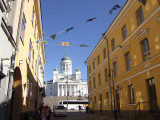
Helsinki and Amsterdam are inviting motorists to take part in a study that aims to offer the most socially responsible driving routes in each city.
Code the Streets – an EU-sponsored mobility initiative which will run throughout October and November – asks drivers to test new functions in the traffic navigation app TomTomAmiGO and Mercedes-Benz’ navigation planner, to better understand how to route motorists in a more environmentally aware way.
This includes suggestions on avoiding roads close to schools, residential areas, and parts of the city with high pollution.
The initiative is a collaboration between the City of Amsterdam, City of Helsinki, Aalto University, Amsterdam Institute for Advanced Metropolitan Solutions (AMS Institute), Forum Virium Helsinki, Technical University Delft and The Future Mobility Network, and is funded by TomTom, Mercedes-Benz and EIT Urban Mobility.
Read the full story here: https://cities-today.com/helsinki-and-amsterdam-invite-motorists-to-code-the-streets/
Extra private SUV cars or shared mobility in your city?

In this short video (5min) Geert Kloppenburg shares his vision on shared mobility in the city.
Please respond by giving your feedback and share in your network!
https://bit.ly/Sharedmobilitynl
For feedback:
Email: geert@geertkloppenburg.nl
Dag van de Duurzaamheid

Op donderdag 7 oktober is het tijd voor de Dag van de Duurzaamheid. In Pakhuis de Zwijger kun je terecht voor een avondvullend programma met talks, screenings, workshops en de uitreiking van de Trouw Duurzame 100. We gaan in gesprek over thema’s als duurzaam bouwen, inclusieve klimaatcoalities, nieuwe afspraken en de COP. We sluiten de avond af met de feestelijke bekendmaking van de meest duurzame initiatieven uit het land.
Praat, doe, denk, vier en leer jij mee deze dag? Schrijf je dan in voor een van de programma’s. Dit kan makkelijk en gratis via de onderstaande link.
Barcelona and Madrid: Forerunners in e-governance

Barcelona is one of the oldest examples of a city that deploys technology as part of its government. Sensor networks have been producing an array of data on transport, energy usage, noise levels, irrigation, and many other topics without having much impact on the life of citizens or solving the underlying problems.
In 2015, Francesca Bria, chief technology, together with mayor Ada Colau started to reverse the smart city paradigm: Instead of starting from technology and extracting all the data we started aligning the tech agenda with the agenda of the city, she said.
One of the first challenges was using technology to increase ordinary citizen’s impact on policy. A group of civic-minded coders and cryptographers created a brand-new participatory platform, Decidem (which means We Decide in Catalan). For more information watch the video below.
Spain offers more inspiring examples. The city of Madrid has also created a participatory citizen platform, not for chance called Decide Madrid, which is in many respects comparable with Decidem, as this short video demonstrates.
The most important features of both platforms are:
Active participation in policy making
Citizens are stimulated to suggest ideas, debating them, and vote. In Barcelona, more than 40.000 citizens have suggested proposals, which form 70% of the agenda of the city administration. The most frequently mentioned concerns are affordable housing, clean energy, air quality and the public space.
The Municipal Action Plan of Barcelona includes almost 7,000 proposals from citizens. Decidem enables citizens to monitor the state of implementation of each of them to increase citizen’s engagement.
Debating
Decide Madrid and Decidem emphasize the value of being informed as starting point for deliberation. Citizens can start discussions on their own and participate in threaded discussions started by others.
As soon as citizens feel informed and have exchanged opinions voting can start. Both Decide Madrid as Decidemhave a space where citizens can make proposals and seeks support. Proposals that reach enough support are prepared for voting. These votes generally are advising the city council.
Policy preparation
Decide Madrid enables citizens amendment legislative texts. The public is allowed to commend any part of it and to suggest alternatives. This also might result in discussions and the suggestions are used to improve the formulations.
Data governance
Decidem and Decide Madrid are also data portals that show data that have been collected in the city, partly on citizens themselves. Decidem has the intention, because of its participation in the European project Decode to enable citizens to control the use of data of their own for specific purposes.
Hybrid solutions
As not every citizen has a computer or is skilled to use the Internet platforms, both cities combine virtual discussions and discussion in a physical space.
It is not only the traditional rivalry between Barcelona and Madrid that has inspired the development of two comparable systems, independently from each other. It is also the fact that the Spanish people had to fight for democracy until rather recently. Democratic institutions that have long existed in many other countries had to be reinvented, but with a 20th-century twist.
The community of Madrid has developed Decide Madrid together with CONSUL, a Madrid-based company. CONSUL enables cities to develop citizen participation on the Internet quickly and save. The package is very comprehensive. The software and its use are free. CONSUL can be adjusted by each organization to meet its own needs. As a result, Consul is in use in 130 cities and organizations in 33 countries (see the map above) and reaches out around 90 million citizens worldwide.
In contrast with e-Estonia, the topic of a former post, the footing of Decidem and Decide Madrid is enabling citizens to make their voice heard and to participate in decision-making. Both cities offer excellent examples of e-governance. e-Governance reflects the mutual communication between municipal authorities and citizens using digital tools to align decision making with the needs and wants of citizens. Instead, the intention of e-Estonia is to improve the efficiency of the operation of the state. Both aims are complementary.
I will regularly share ‘snapshots’ of the challenge of bringing socially and ecologically sustainable cities closer using technology if useful. These posts represent findings, updates, and additions to my e-book Humane cities. Always humane. Smart if helpful. The English version of this book can be downloaded for free below.
Amsterdam Reist Slim: doe mee aan de proef!

De gemeente Amsterdam en de Hogeschool van Amsterdam starten in november 2021 een onderzoek naar het reisgedrag van Amsterdammers. Een bereikbare en leefbare stad begint bij de behoeften van de inwoners. Hoe vaak, wanneer en met welke voertuigen verplaatsten ze zich door de stad? Dat zijn vragen waar we met de proef antwoord op willen krijgen.
Over het onderzoek
De proef wordt uitgevoerd met behulp van de slimme app Fynch. Fynch biedt niet alleen een helder overzicht van iedere gemaakte rit, ook de CO2-uitstoot, afgelegde kilometers, vermeden spitsuren en aantal minuten beweging per dag worden bijgehouden. De Hogeschool van Amsterdam onderzoekt het reisgedrag van Amsterdammers via de ritten in de app en stuurt tijdens het onderzoek twee vragenlijsten om nog meer te weten te komen over de reisbehoeften van de deelnemers.
Doe mee aan de proef
Woont u in Amsterdam en heeft u een auto? Meld u dan aan via onderstaande link! U draagt bij aan de ontwikkeling van een leefbare en bereikbare stad en ontvangt na afloop van de proef een bol.com bon van €20.
Toekomstwandeling dwars door Amsterdam
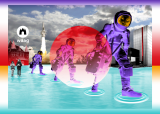
Sinds de pandemie zijn we massaal aan de wandel geslagen. Ontspannen, een goed gesprek voeren en nadenken over de toekomst: dat alles vind je terug in de Toekomstwandeling dwars door Amsterdam. We beginnen bij onze outpost op het Amsterdam Science Park: planet B, en wandelen richting het eindpunt op de Nieuwmarkt: Waag.
Tijdens de wandeling dwars door Amsterdam lopen we langs pleinen, parken en door buurten die de aanleiding zijn voor gesprekken over de stad, het land en onze toekomst. In wat voor wereld wil je wel of niet leven? Wat vind je belangrijk op het gebied van wonen, samenleven, voedsel, technologie en het klimaat? Wat is jouw droomtoekomst? Waar is verbetering nodig en hoe komen we daar?
Laat je verrassen, leer van elkaar, bekijk de wereld met andere ogen. Breek uit je bubbel en verken de ideale toekomst met vage bekende en nieuwe vrienden.
Wanneer: zaterdag 25 september
Starttijden: 13:00 | 13:30 | 14:00
Locatie: Planet B, Startup Village, Science Park Amsterdam
Eindpunt: Waag, Nieuwmarkt, Amsterdam
Belangrijke praktische informatie:
- De wandeling duurt anderhalf tot twee uur (5 km). Je begint bij het Science Park en wandelt via Amsterdam-Oost naar de Waag op de Nieuwmarkt.
- Bij aankomst in de Waag (1e verdieping) is de bar geopend voor een hapje en een drankje.
- Kom je op de fiets naar Amsterdam Science Park? Je fiets wordt terwijl je wandelt naar de Nieuwmarkt vervoerd. Zo kun je vanaf daar weer gemakkelijk naar huis komen!
- Je kunt samen met een vriend of vriendin wandelen, of meedoen aan de matchmaking en je laten verrassen! Dit kun je ter plaatse beslissen.
- Je hebt de keuze uit drie verschillende starttijden, om te grote drukte te voorkomen.
Waag Future Lab
Waag is sinds 2021 een Future Lab voor Design en Technologie van Nederland. Waag organiseert in de komende jaren meerdere expedities naar planet B. Hierin zoekt ze naar antwoorden op de sociale, technologische en ecologische uitdagingen van onze tijd. Ze vormen een platform voor ontwerpers, wetenschappers, beleidsmakers en burgerinitiatieven. Elke expeditie, met een looptijd van een half jaar, verkent een deelaspect van een gezamenlijke, gewenste toekomst. De eerste expeditie is een navigator en een routekaart naar de toekomst. Wat verstaan we eronder, wat verwachten we ervan? Waag gaat het land in en gaat met iedereen in gesprek. Wat is voor jou een wenselijke toekomst, wat kun je daar zelf aan bijdragen en wat heb je daarvoor nodig?
Acid Clouds: een wandeling langs de fundamenten van het internet
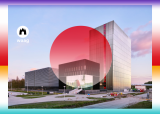
Elke week stijgt onze schermtijd. We swipen, streamen, downloaden, en liken ons suf: een steeds groter deel van ons leven speelt zich online af. Al die data moet ergens worden opgeslagen. Maar waar? Wandel op zaterdag 25 september mee langs de fundamenten van het internet in Amsterdam Science Park en bekijk datacenters van een hele nieuwe kant.
We starten om 11 uur bij outpost planet B op het Science Park. Dit is de plek waar het eerste datacenter van Nederland is gevestigd (SARA Surf). In een interactieve en afwisselende route van ongeveer een uur, met informatie, vragen en gespreksstof, voeren we je langs het verleden en de toekomst van de digitale wereld. Uiteraard helemaal corona-proof! Een selectie van de prachtige foto’s van wel 100 Nederlandse datacenters, gemaakt door Niels Schrader en Roel Backaert, maakt onderdeel uit van de route. Samen met andere wandelaars ontrafel je de geschiedenis en verken je de (digitale) toekomst.
Op zaterdag 25 september 11 uur openen we de buiten-fototentoonstelling Acid Clouds van Niels Schrader (DE/VE, 1977) en Roel Backaert (BE, 1978). Direct aansluitend start de wandeling.
Wanneer: zaterdag 25 september 11 uur
Waar: outpost planet B, Science Park
Nodig: goede schoenen, opgeladen telefoon (voor het interactieve gedeelte), flesje water
Afstand wandeling: ongeveer 2,5 kilometer
Duur wandeling: 1 uur
Expeditie: toekomst
De wandeling is onderdeel van Expeditie: toekomst, een festival vol wandelingen, workshops en talks, waarin de verkenning van de toekomst centraal staat.
Niels Schrader over Acid Clouds
‘Data zijn het vervuilingsprobleem van het informatietijdperk’, schreef de Amerikaanse cryptografiedeskundige Bruce Schneier in 2015. ‘Dat zette Niels Schrader aan het denken. Samen met Roel Backaert vormt hij het duo achter het project Acid Clouds. Ze brengen datacenters in Nederland in kaart voor hun onderzoek naar de impact van de digitale wereld op onze fysieke leefomgeving. ‘Door de datacenters in beeld te brengen willen we mensen bewust maken van de steeds grotere plek die de digitale wereld begint op te eisen in onze fysieke leefomgeving. Daar zouden meer mensen iets van mogen vinden.’ Lees het interview met Niels Schrader.
Waag Future Lab
Waag is sinds 2021 een Future Lab voor Design en Technologie van Nederland. Waag organiseert in de komende jaren meerdere expedities naar planet B. Hierin zoekt ze naar antwoorden op de sociale, technologische en ecologische uitdagingen van onze tijd. Ze vormen een platform voor ontwerpers, wetenschappers, beleidsmakers en burgerinitiatieven. Elke expeditie, met een looptijd van een half jaar, verkent een deelaspect van een gezamenlijke, gewenste toekomst. De eerste expeditie is een navigator en een routekaart naar de toekomst. Wat verstaan we eronder, wat verwachten we ervan? Waag gaat het land in en gaat met iedereen in gesprek. Wat is voor jou een wenselijke toekomst, wat kun je daar zelf aan bijdragen en wat heb je daarvoor nodig?
TEDxAmsterdam is looking for sustainable entrepreneurs

Are you a sustainable entrepreneur and would you like to take that next step? TEDxAmsterdam is looking for initiators of disruptive innovations and concrete ideas that fit our planet's future needs; social and/or environmentally. We offer 1-on-1 mentorship, business & storytelling workshops, pitch coaching and presentation design. And the chance to present on a TEDx stage.
Who are our pioneers?
The Impact Program is suitable for people from all walks of life with an ambitious and entrepreneurial nature. It specifically caters to those in need of guidance to jumpstart benevolent solutions within the Amsterdam region. We are not talking about idealistic dreams and utopian fairy tales but rather initiators of disruptive innovations and concrete ideas. We like to call these great minds “Pioneers”.
The criteria
- All pioneers(s) or team members must be at least 18 years old
- The pioneer needs to have a concrete, actionable business idea or product
- A genuine excitement to have a positive impact within Amsterdam and beyond
- Each pioneer must demonstrate unwavering commitment to work on their business idea
- Each pioneer must make a commitment to spend around 2 to 3 hours a week at the program; e-learning, online and offline coaching, home work
- Available in Oct/Nov/Feb for a monthly offsite event
- The Pioneer is comfortable enough to speak at a TEDx event in English
For the idea to be suitable, you will want to keep in mind about whether you:
- Found a problem worth solving
- Have a viable business model (problem/solution fit) for the product/service
- Have conducted market and competitor research
- Are fully committed to continue with the startup development
- Have a proof of concept or Minimum Viable Product in place or working on it
- Have already some traction
Sign up for the TEDxAmsterdam Impact Program and let us help you bring your idea(s) to life. Apply before October 3rd.
The birth of a new green cooperative

In the city of Arnhem a new green cooperative is founded by the students and teachers of the course "Organic Growing in the City". The new cooperative is two years old and has 54 organic urban growers as members. You will watch the green cooperative growing in the future years.
Donut Meet & Greet
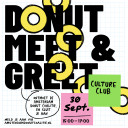
Always wanted to meet Kate Raworth in an intimate setting and exchange stories with other local & global donut fans?
Then this is your chance!
On Thursday, September 30, 15.00 - 17.00 CET, the Donut Meet & Greet Event will take place during the Amsterdam Doughnut Days at the new AHK Culture Club!
What you can expect:
- international (live) video messages from Spain, Barbados, Frankfurt, Copenhague and beyond
- informal talk about DEAL from the DEAL team itself
- inspiring donut examples from the community and opportunities for you to join
- sneak peek into the results of the donut events from the previous days
- enough time for us to share and connect experiences
- drinks at Clubhouse to network and celebrate
Due to popular demand are all seats are taken. If there are any cancellations, you can score a seat by filling out this form.
Community management op de campus
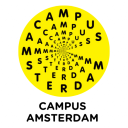
Wat is community management eigenlijk? en hoe zorg je voor verbinding onder je leden op een campus? Wat zijn de succesfactoren en waar te starten? Aan de hand van een aantal cases en kennis uit het Campus Amsterdam netwerk gaan we dieper in gesprek over dit hot topic. Bij niemand minder dan H20 e-sports.
10 years of SensemakersAMS: Learnings & a look into the future
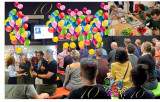
In September the Sensemakers Community celebrates her 10th anniversary. Due to Covid not with an offline party, but online with speakers that will give an overview of (the learnings from) the changing landscape and a speculative look into the future!
Wandelen naar de toekomst: de smart citizen-wandeling
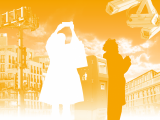
De slimme stad, wat is dat eigenlijk? Kan iets dat geen hersenen heeft slim zijn? Waag gaat er vanuit dat niet de stad, maar de burger slim is: smart citizens in plaats van smart cities. Vanaf 23 augustus kun je met het wandelpakket van Waag de smart citizen-wandeling lopen in Utrecht, Rotterdam en Amsterdam. Wandel de stadsroute en ga mee op zoek naar de sporen van de slimme stad!
Meld je aan om het wandelpakket te ontvangen. De wandeling is corona-proof en te doen wanneer het jou uitkomt.
Take a virtual tour of eco-hub de Ceuvel

At de Ceuvel we host private tours for interested individuals, schools, companies and other parties. Whether you’re an architect, technical engineer, a high school student, or just a generally interested person: there will be someone at de Ceuvel that can explain our story in a way that’s relevant to your background.
The tour covers the story of De Ceuvel. You will learn about sustainability & the circular economy, urban renewal strategies, architecture and communal experimentation and bottom-up development.
Our virtual tour of de Ceuvel was developed during the corona lockdown. Instead of physically visiting our site, we can show you around virtually! The online tour, or webinar, is conducted in a Zoom meeting. Our guide welcomes you in this virtual environment at a time and date of your convenience. Using photos, exclusive videos and illustrations unavailable elsewhere, we tell the story of our unique site. There will be ample time for questions and conversations with the live tour guide.
The virtual tour can be given to a large group of Zoom participants, or as a remote speaker during a physical event. It is suitable in various contexts: as a guest lecture for schools or universities, as a program item of an (online) sustainability conference, as part of a more extensive (company) training course, or in whatever setting you've designed.
Wat vind jij? Verdient serious gaming een stevigere plek in het aanpakken van transities?
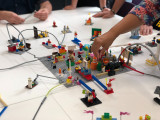
Serious gaming is een mooi hulpmiddel voor samenwerking en
besluitvorming in de energietransitie. In de afgelopen jaren hebben we
voorbeelden gezien van spellen die complexe vragen begrijpelijk kunnen maken. Neem bijvoorbeeld de HEAT tool van Alliander, het WE-Energy spel van de Hanzehogeschool Groningen, de sustainability DNA game van de Ceuvel, het Klimaatspel Plan Zuid van de Gemeente Amsterdam en het participatiespel van de Hogeschool van Amsterdam. Stuk voor stuk interessante serious games die ingewikkelde processen van verduurzamingsopgaven eenvoudiger maken.
De Hogeschool van Amsterdam en Amsterdam Smart City zoeken samen hoe we de meerwaarde van serious gaming voor energieprojecten kunnen verhogen. Enerzijds omdat we ons afvragen of de potentie wel volledig wordt benut. Anderzijds omdat opvalt dat structurele toepassing, of op grotere schaal, uitblijft. De zoektocht staat nog ver aan het begin, maar we gaan graag met anderen hierover in gesprek. En daarom vragen we jou om met ons mee te denken.
Voor wie zijn serious games?
Serious games zijn er genoeg, maar ze verschillen in de inhoudelijke focus, schaalniveau en doelgroep. Sommigen gaan uitsluitend over energie, anderen ook om andere aspecten van gebiedsontwikkeling. Daarbinnen kan het gaan over een hele regio of een bepaalde buurt. Omdat de energietransitie gaat om multistakeholder samenwerking, hebben meerdere doelgroepen baat bij het spelen van een serious game over dit onderwerp. Denk aan beleidsmakers en (nuts)bedrijven, die bijvoorbeeld moeten samenwerken om een warmtenet te realiseren.
Een doelgroep die hier niet kan ontbreken is natuurlijk de bewoner. Voor hen lijkt de toegevoegde waarde van serious games nog wel het grootst. Juist vanwege de laagdrempeligheid van een serious game is het bij uitstek een middel om mensen te helpen complexe informatie te begrijpen. Hoe meer je speelt, hoe beter je het begrijpt. En het begrijpen van een onderwerp is een belangrijke voorwaarde om mee te kunnen denken, praten en besluiten over een onderwerp. Een belangrijke reden om dit soort spellen extra serieus te nemen. Bovendien biedt een spel de mogelijkheid om gelijkwaardig met elkaar in gesprek te gaan. Verschillen in sociaaleconomische status zijn eigenlijk niet van belang. Sterker nog, spellen bieden juist gelegenheid om in elkaars schoenen te staan. Het helpt om elkaars perspectieven te begrijpen, of je nu bij de gemeente werkt, bij een netbeheerder, een woningcorporatie, of je huurder bent of woningeigenaar. Zo zijn er nog wel meer voordelen te benoemen. Voordelen die ook kunnen gelden voor andere transities dan de energietransitie.
Kansen
In de praktijk lijken we deze voordelen niet voldoende te benutten. Serious gaming voor de energietransitie is weliswaar op verschillende plekken ontwikkeld, maar in beperkte mate, en niet structureel toegepast. Daar komt bij dat we er ook weinig van weten. Welke spelmechanismes werken en welke niet? Wanneer zet je zo’n spel het beste in? Bij het ophalen van ideeën, de daadwerkelijke besluitvorming, of ook in de evaluatie? Zijn er eigenlijk ook risico’s? Zijn er redenen om serious gaming absoluut niet te willen gebruiken in het energieneutraal maken van wijken?
En dan nu de vraag aan jou!
Om de zoektocht kracht bij te zetten vraag ik namens Amsterdam Smart City onze community om hulp. Hoe kijk jij aan tegen serious gaming als middel om te werken aan transitieopgaven? Zie je de toegevoegde waarde van zo’n game voor buurtparticipatie? En van welke voorbeelden zouden we moeten leren – of wellicht als netwerk moeten door ontwikkelen?
We zijn benieuwd naar je ervaringen! Laat je reactie achter in de comments!
e-Estonia: A great example of e-government

e-Estonia is currently the most ambitious project in technology-assisted policymaking in the world. It includes anybody involved with government and it has changed the daily life of citizens. Almost all public services are involved: Legislation, voting, education, justice, health care, banking, taxes, and police. These are digitally linked to each other via one platform. Only for marriages, divorces and real-estate transactions, a visit to the town hall is mandatory.
The country’s ICT-infrastructure has been developed by government, along with a few Estonian companies. The state has been the driving force behind this project and has attracted the best specialists of the country. Below, I mention some of the features of the project.
Infrastructure
Estonia has developed an ICT-infrastructure – the Government Cloud - that all government agencies and most companies use. This makes possible almost perfect interoperability in accordance with the highest level of IT Security Standards (ISKE).
To be protected against external cyberattacks, such as in 2007, there is a full back-up. This is in a datacenter in Luxemburg, which has an internationally accepted status as ‘embassy’. It works under Estonian state control and can take over the most critical services seamlessly.
Data protection
Data is not stored centrally. Instead, the government data platform, X-Road, connects individual servers via end-to-end encrypted pathways. In the Estonian system any individual owns all information that is recorded about him or herand any use that is made of it is recorded.
This video explains how X-road works.
The backbone of Estonia’s digital security is a blockchain technology called KSI. It is designed in Estonia and applied worldwide today. It guarantees complete privacy and excludes anyone from manipulating the data. KSI blockchain technology documents all actions in the system and protects information without access to the information itself.
The technology has been developed together with Guardtime, a company founded in 2007 in Estonia, that has exporting the system globally and therefore has offices around the world.
The Dutch Judicial Information Service (Justitiële Informatiedienst) has chosen Guardtime’s KSI Blockchain technology for integrity assurance of new e-services. The blockchain integration ensures transparency, verifiability and security of the information that is processed in government systems.
Voting
Whereas most technology advanced countries still let people vote with pen and paper or use primitive voting machines, from 2007 Estonia applies e-voting for parliament election and elections at municipal level.
With e-Voting, voters can cast their vote from any computer with an internet connection anywhere in the world: During a designated period, voters log in to the system with an ID-card or Mobile-ID, and cast a ballot. To ensure anonymity, the voter’s identity is removed from the ballot before it reaches the National Electoral Commission, which counts the votes. Every system of remote voting, including traditional ballot papers sent by post, risks buying or enforcing someone’s vote. Estonia’s solution is the possibility to change his or her vote later with only the last vote counting.
Streamlining decision-making
Governmental bodies at all levels use a paperless information system – e-cabinet – that has streamlined decision making and reduced the time spent on meetings with 80%. Well before the start of a meeting, participants view the agenda items and determine their opinion. If they have objections or want to discuss the subject, they click on a box. The opinions of all participants are therefore known in advance. If there are no objections, decisions are taken without debate.
This video below demonstrates the operation of e-cabinet.
Residency program
Like many other European states, the population of Estonia is shrinking. Increasing the number of babies is complicated, so a digital residency program was launched in 2014, in style with the Estonian e-government project. Any foreigner can become Estonian resident without ever visiting the country and can participate in Estonian services, such as banking. Estonia has liberal rules for technological research and the lowest corporate tax rates in the European Union.
About 28.000 people have applied for an e-residency, including many owners of small businesses from the United Kingdom who want to be based in the EU.
The footing of e-Estonia is – according to the government – to facilitate and improve the life of citizens and to make the government more efficient. This goal certainly has been achieved. The total amount of savings is calculated at 2% of GNP.
Technology can play a role in improving the quality of the formal organization, decision making, the provision of services and the relationship with all stakeholders. In this context, concepts such as e-government (digital government) and e-governance are often used. Estonia offers a great example of e-government. For e-governance - the mutual communication between municipal authorities and citizens using digital tools - we better take Spain as an example, as I will explain in a next post.
I will regularly share with you ‘snapshots’ of the challenge to bring social and ecological sustainable cities closer using technology - if helpful. These posts represent findings, updates, and supplements of my e-book Humane cities. Always humane. Smart if helpful. The English version of this book can be downloaded for free below.
Stay up to date
Get notified about new updates, opportunities or events that match your interests.

